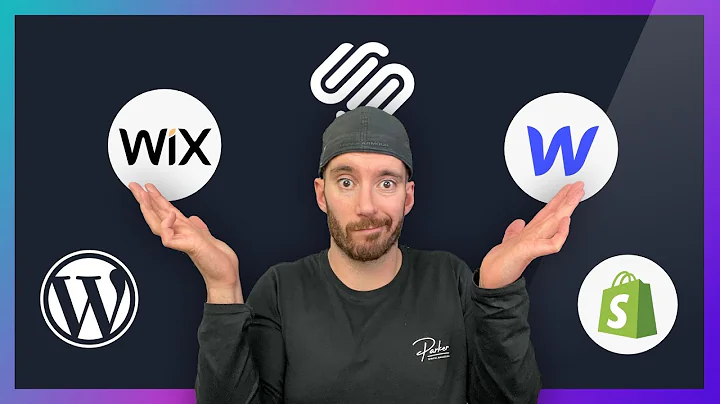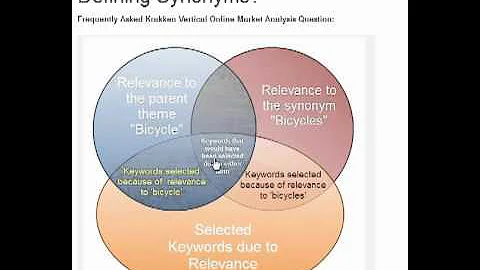Mastering SEO: Unveiling the Truth behind its Essentials
Table of Contents
- What is Search Engine Optimization?
- Understanding Google and How it Works
- The Three Key Elements of SEO: Crawling, Indexing, and Ranking
- 3.1 Crawling: How Google Finds Your Website
- 3.2 Indexing: Understanding Your Website's Content
- 3.3 Ranking: Determining Search Results
- Improving Your Website's Crawling
- 4.1 Testing if Your Website is Indexed Correctly
- 4.2 Submitting URLs for Indexing
- 4.3 Encouraging Crawlers to Find Your Homepage
- 4.4 Linking Your Website to Established Sites
- Enhancing Indexing for Better Search Results
- 5.1 Optimizing Page Titles
- 5.2 Using Page Headings Effectively
- 5.3 Balancing Text, Images, and Videos
- Achieving Higher Rankings with Effective Keyword Strategies
- 6.1 Understanding the Importance of Keywords
- 6.2 Relevance: Matching User Search Intent
- 6.3 Authority: Building Trust and Backlinks
- 6.4 Volume: Assessing Search Demand
- 6.5 Utilizing SEO Tools for Keyword Analysis
🧲 The Basics of Search Engine Optimization
Search engine optimization (SEO) is a vital aspect of online marketing, helping websites increase their organic traffic and improve their rankings on search engine results pages (SERPs). While SEO may seem like a buzzword, it plays a crucial role in driving website visibility and attracting potential customers. In this article, we will delve into the fundamentals of SEO and explore how Google, the world's leading search engine, understands and ranks websites. By understanding the key elements of crawling, indexing, and ranking, you can implement effective strategies to optimize your website and boost your online presence.
1️⃣ What is Search Engine Optimization?
At its core, SEO is a strategy that aims to enhance a website's visibility and relevance on search engines. When a user conducts a search on platforms like Google, they enter specific keywords or phrases related to their desired information or product. SEO focuses on optimizing websites to align with these keywords, helping them appear higher in search results and attract targeted organic traffic.
2️⃣ Understanding Google and How it Works
Google, the dominant search engine worldwide, utilizes complex algorithms and processes to deliver accurate and relevant search results to users. To comprehend the workings of SEO, it is essential to understand the three key elements of crawling, indexing, and ranking that constitute Google's search system.
3️⃣ The Three Key Elements of SEO: Crawling, Indexing, and Ranking
3.1 Crawling: How Google Finds Your Website
Crawling is the process through which search engines discover and analyze websites and web pages. Google employs automated programs known as crawlers or spiders that navigate cyberspace, visiting websites, and identifying new pages. When you launch a new website, these crawlers search for its URL, recognizing the site's existence in cyberspace. It is crucial to ensure that your website is accessible and that the crawlers can explore its subpages successfully. Testing if your website has been indexed correctly and utilizing sitemaps are effective methods to improve the crawling element.
3.2 Indexing: Understanding Your Website's Content
After a website is discovered through crawling, Google's indexing process occurs. Indexing involves an indexing bot that examines the content, including text, images, and videos, present on your website. The bot analyzes this information to understand the essence of your website, the products or services you offer, and the topics you cover. It categorizes your website within its index, creating a virtual card that represents your website and its content. Optimizing page titles, using headings effectively, and maintaining a balanced mix of text and media enhance the indexing process, allowing Google to grasp your website's relevance accurately.
3.3 Ranking: Determining Search Results
When a user performs a search on Google, the search engine algorithm retrieves the most suitable content to display. Google's ranking system ascertains the best results for each query based on various factors such as the user's location, language, and device. Unlike popular misconceptions, Google's organic ranking does not accept payments for higher positions. The ranking is determined by the relevance, authority, and volume associated with specific keywords. Effective keyword strategies, including understanding search intent, building authority through backlinks, and assessing search demand, are crucial for achieving higher rankings on Google.
4️⃣ Improving Your Website's Crawling
To ensure that Google accurately detects and indexes your website, you can take several actions to enhance the crawling process.
4.1 Testing if Your Website is Indexed Correctly
Verifying that your website is indexed correctly is the first step toward effective SEO. Simply input your website's URL into Google's search bar and observe the number of indexed results. If the displayed number matches the actual number of pages on your website, Google has successfully indexed your site.
4.2 Submitting URLs for Indexing
If you have web pages that have not been indexed, you can manually submit their URLs to Google. This process notifies Google of the existence of these pages and expedites the indexing process. Alternatively, creating a sitemap—a navigation system embedded within your website—provides Google's crawlers with a comprehensive list of your site's pages, streamlining the indexing process.
4.3 Encouraging Crawlers to Find Your Homepage
Promoting your website's homepage as the starting point for crawlers enhances the efficiency of the crawling process. By ensuring that your homepage attracts the crawler's attention, you establish a solid foundation for subsequent page discovery.
4.4 Linking Your Website to Established Sites
By linking your website to credible and authoritative sites that Google already recognizes, you increase the chances of your website being discovered by crawlers. However, exercise caution when utilizing paid link distribution services, as Google may not follow such links.
5️⃣ Enhancing Indexing for Better Search Results
To improve the indexing process and increase the accuracy of search results for your website, focus on optimizing specific elements.
5.1 Optimizing Page Titles
Craft concise and meaningful page titles that directly convey the message and purpose of each page. Ensure that your titles are direct, straightforward, and free from complicated jargon. By using clear and relevant page titles, you enable search engine bots to grasp the essence of your content accurately.
5.2 Using Page Headings Effectively
Make effective use of page headings to provide structure and hierarchy to your website's content. By utilizing appropriate HTML tags for headings, you enhance the user experience and aid search engines in understanding the key sections of your pages.
5.3 Balancing Text, Images, and Videos
While visual elements like images and videos enhance user engagement, it is essential to provide accompanying textual information. Search engine bots primarily analyze text, so ensure that your website contains sufficient text content to accurately describe your products, services, or topics. Adding captions and annotations to images and videos also assists bots in comprehending their context.
6️⃣ Achieving Higher Rankings with Effective Keyword Strategies
Effectively targeting the right keywords is a fundamental aspect of SEO that directly influences your website's rankings. Understanding the importance of keywords and employing effective keyword strategies are vital for improved visibility and increased organic traffic.
6.1 Understanding the Importance of Keywords
Keywords are the words or phrases users enter into search engines when seeking specific information or products. By aligning your website's content with relevant keywords, you increase the likelihood of appearing in search results related to your industry or niche.
6.2 Relevance: Matching User Search Intent
Relevance is a crucial factor in keyword optimization. Your content must be relevant to user search queries and provide the information or solution they are seeking. By delivering content that aligns with user intent, you enhance the user experience and increase the chances of ranking higher on search engine results pages.
6.3 Authority: Building Trust and Backlinks
Authority plays a significant role in SEO. Websites with higher authority are considered more reliable and trustworthy by both users and search engines. To build authority, focus on earning quality backlinks from reputable websites within your industry. Backlinks act as an endorsement and signal to search engines that your website is a valuable resource.
6.4 Volume: Assessing Search Demand
Assessing keyword search volume helps you gauge the popularity and competition associated with specific keywords. Tools like SEMrush and Ahrefs provide valuable insights into search volume trends, enabling you to choose keywords that strike a balance between demand and competition.
6.5 Utilizing SEO Tools for Keyword Analysis
To facilitate effective keyword research and analysis, various SEO tools are available. Tools like SEMrush and Ahrefs offer comprehensive keyword data, including monthly search volumes, keyword difficulty scores, and competitor analysis. Leveraging these tools enables you to identify high-potential keywords and optimize your content accordingly.
✨ Highlights
- SEO is crucial for improving website visibility and organic traffic.
- Understanding Google's crawling, indexing, and ranking processes is essential for effective SEO.
- Enhancing crawling involves testing site indexing, submitting URLs, emphasizing the homepage, and leveraging authoritative links.
- Optimizing page titles, headings, and content balance is key to improving indexing and user experience.
- Keyword strategies should focus on relevance, authority, and search volume to enhance search engine rankings.
- SEO tools like SEMrush and Ahrefs provide valuable insights for keyword analysis and competition assessment.
❓ Frequently Asked Questions
Q: Can I pay to increase my website's organic ranking on search engines?
A: No, Google's organic ranking cannot be influenced or manipulated through monetary means. While paid advertising and Google Ads can boost visibility, the actual organic ranking relies on factors such as relevance, authority, and volume.
Q: How can I determine the most effective keywords for my website?
A: Utilize SEO tools like SEMrush and Ahrefs to conduct keyword research and analysis. Consider factors such as relevance to your target audience, search volume, and competition level. By assessing these variables, you can identify high-potential keywords to optimize your content.
Q: Is it necessary to have a balance of text, images, and videos on my website?
A: While visual elements like images and videos enhance the user experience, it is crucial to have accompanying textual information. Textual content aids search engine bots in understanding the context and relevance of your visual elements. Ensure that you strike a balance to cater to both user engagement and search engine optimization.
Q: How long does it take for a website to be indexed by Google?
A: The indexing process timeframe varies and depends on several factors, including the website's size, structure, and crawlability. Generally, it can take anywhere from a few days to a few weeks for Google to index a website fully. Implementing proper crawling enhancements and utilizing a sitemap can expedite the process.
Q: Does the search volume of a keyword impact its competition level?
A: Generally, higher search volume indicates increased competition for a keyword, as more websites are likely targeting it. However, it is essential to consider other factors such as keyword difficulty and your website's authority to assess the competitiveness accurately. A comprehensive keyword analysis using SEO tools will provide valuable insights into these dynamics.







